Do you like working with kids and solving challenging problems? The field of child psychology is a fast-growing area, making it an ideal time to consider this as your career. It’s also a rewarding job that allows you to help people while continuing your education. Becoming a child psychologist requires several years of training and education, so having the correct resume is essential to get you there. Whether you are currently looking for jobs or thinking ahead to future opportunities, crafting an effective resume will show hiring managers that you are serious about your career and equipped for the responsibilities of this position. A practical overview helps you stand out from other applicants by highlighting your skills and experience at a glance. It should be concise, organized, and easy to read with no unnecessary information or jargon. This guide will walk you through how to write a child psychologist resume that effectively presents your qualifications and tips for what to include and leave out.
Child Psychologist Resume Example

Download This Child Psychologist Resume as PDF
School Psychologist Resume Example
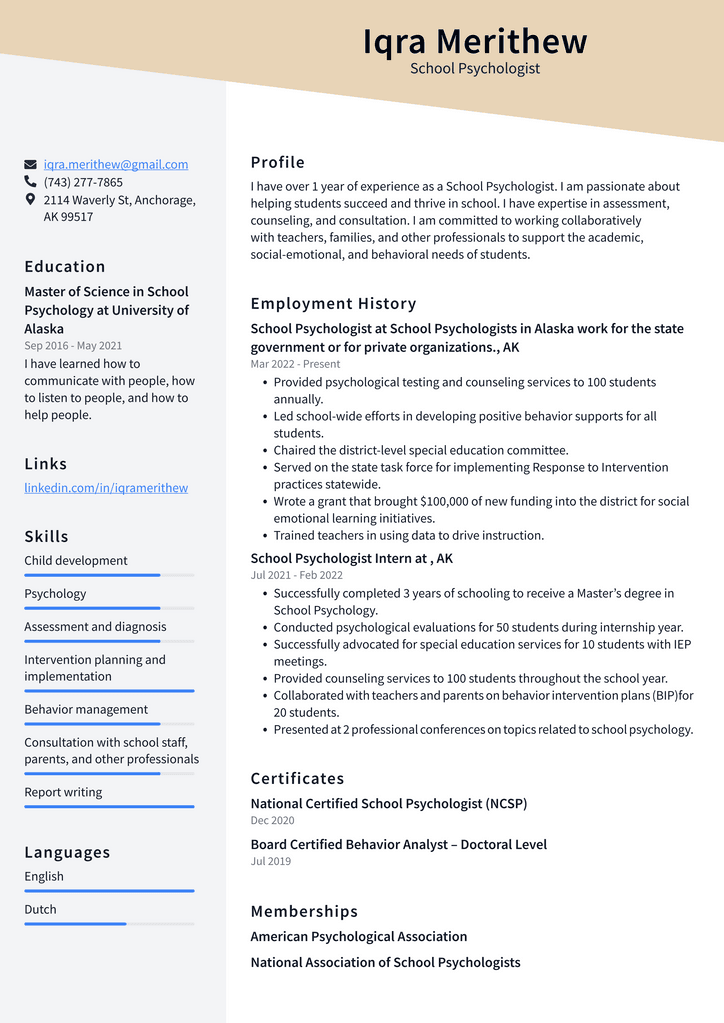
Download This School Psychologist Resume as PDF
Forensic Psychologist Resume Example
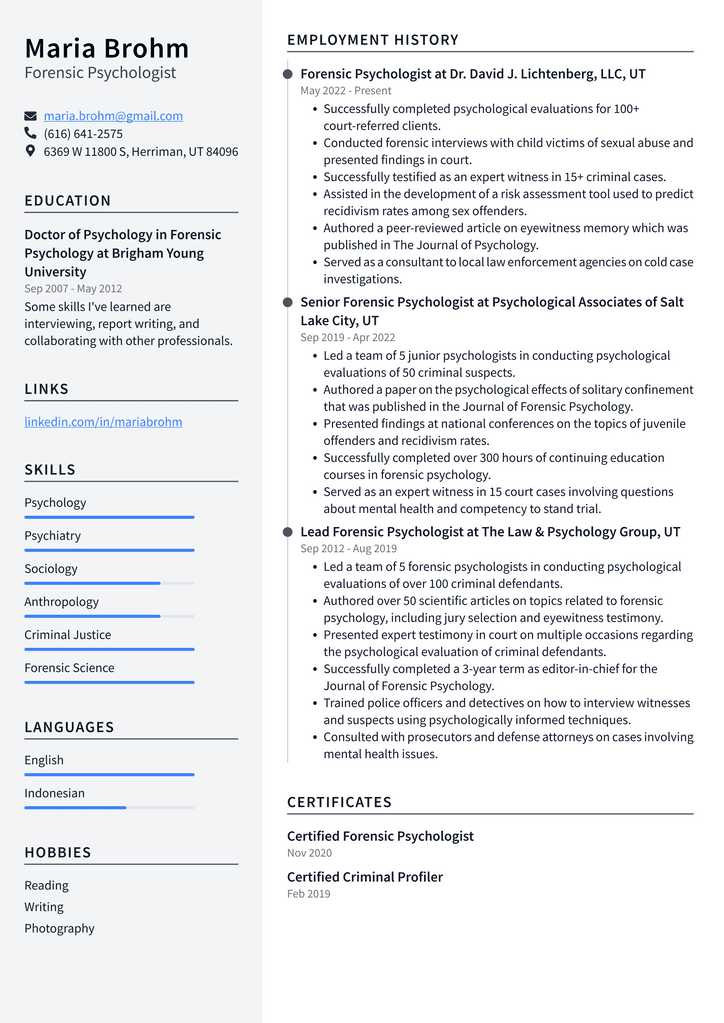
Download This Forensic Psychologist Resume as PDF
Neuropsychologist Resume Example
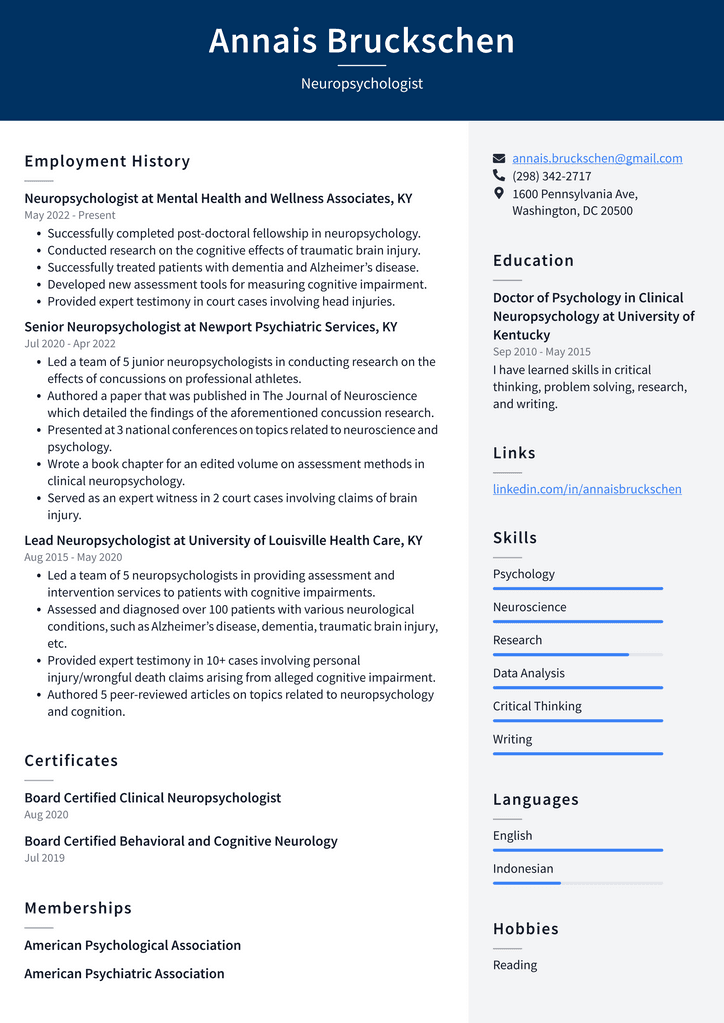
Download This Neuropsychologist Resume as PDF
Counseling Psychologist Resume Example
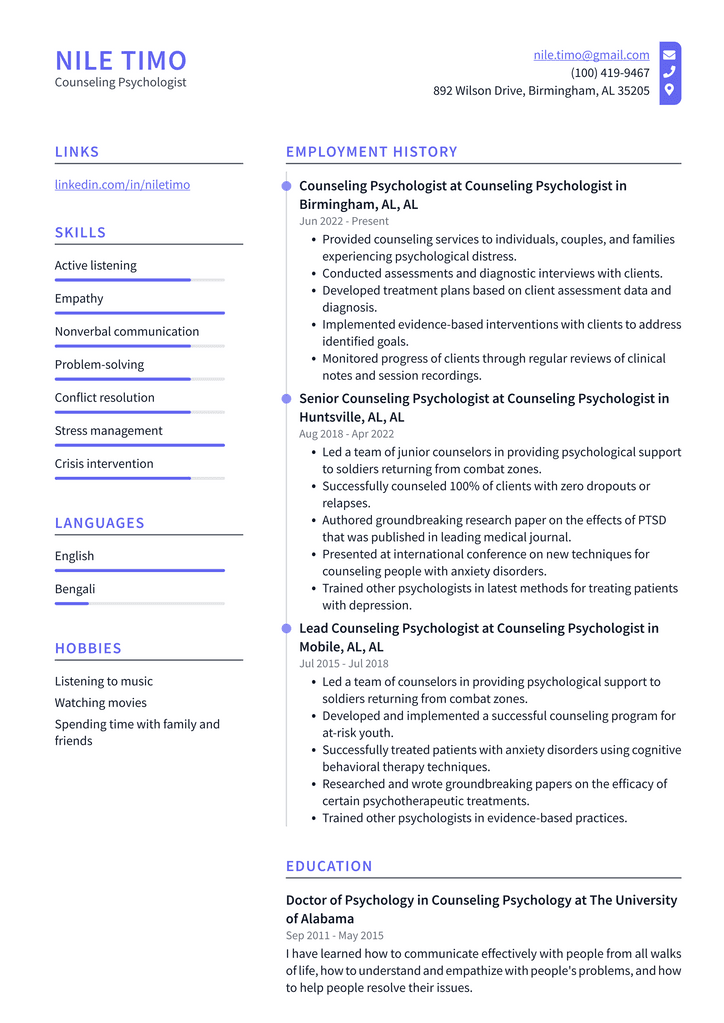
Download This Counseling Psychologist Resume as PDF
Developmental Psychologist Resume Example
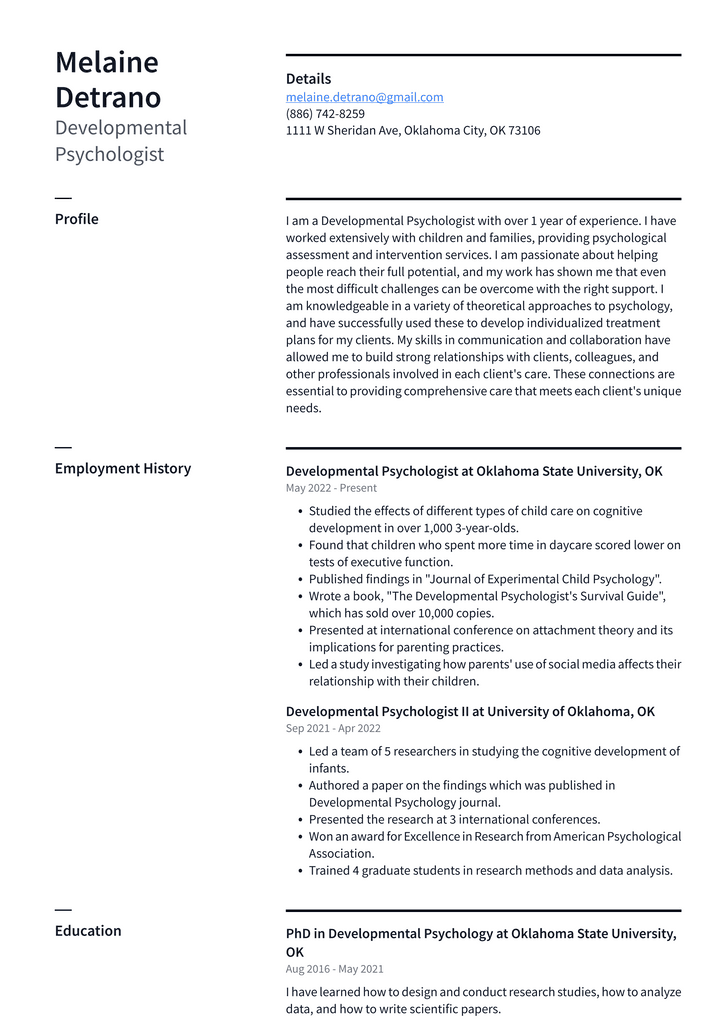
Download This Developmental Psychologist Resume as PDF
Clinical Psychologist Resume Example

Download This Clinical Psychologist Resume as PDF
What You Should Know About Writing a Child Psychologist Resume
First, remember that a resume is not an autobiography or a complete account of every job you’ve ever held. Instead, it should be a concise overview of your skills and experiences relevant to the position you are applying for. This means you should only include the information supporting your strengths and showing you are a strong fit for the job. A resume should follow the same format and contain the same information on each position you’ve held. While the type of job and education are essential, they are not as important as the experience you’ve gained. You may have an excellent education and knowledge but not have enough experience to apply for the position. If this is the case, you may consider looking for a position as a stepping stone toward your desired job.
Basics of a Resume
A resume is a short document highlighting your skills and experience to apply for jobs. It shows hiring managers what you have to offer and provides a quick overview of your background. A resume helps you stay organized, thanks to its simple, straightforward format. There are many formats for resumes, but the content should remain consistent across all forms. Your resume should include the following: – Your name and contact information: Include your name, phone number, and email address at the top of your resume. If you don’t include this information, hiring managers may have difficulty getting in touch with you. – Education: Include the name of the school, the degree you earned, the date you graduated, and any honors or special recognitions you received. – Experience: This section is where you’ll list your job experience and other special skills. – Summary: This is a brief overview of your skills, education, and work experience that you should write last.
Choose the Right Format
The format you use should depend on your experience and the job you are applying for. If you’re starting, a chronological resume format may be best. If you have extensive experience, you can use a combination of functional resume formats to highlight your skills. Certain professions, like education and social work, may also require a helpful resume format. Chronological – A chronological resume highlights your experience and education in reverse chronological order, with your most recent position listed first. This is best for those with limited understanding or just starting in the workforce. It is also a good choice if you have a degree in a non-related field but want to show employers how your skills and experience translate to the job. Combination – A combination resume format is also commonly used by people with experience. This format blends chronological and functional elements to present your skills and experience in an organized way. If a hiring manager sees your qualifications match the job description, they can easily find the information they are looking for. Functional – A functional resume format allows you to highlight your skills and experience without listing a job history. This format is commonly used by people with extensive backgrounds, such as those switching to a new career. This resume format allows you to focus on your qualifications without explaining where you got your experience.
Tips for Writing a Resume for a Child Psychologist Job
Remember that your resume is a marketing tool that should sell you as a job candidate. Start with a clear, descriptive title to entice employers to read more. Next, organize the content in a way that clearly shows your skills, education, and experience. Finally, write concisely and avoid including unnecessary information. Keep your resume between one and two pages long. You can include more detail in a separate attachment if you need more space. Also, make sure to spell-check and proofread your resume for any typos or errors. Finally, it’s essential to tailor your resume to each job application. While there are many tips for writing a child psychologist resume, the most important is to show hiring managers why you are the right person for the job.
Skills to Include in Your Child Psychologist Resume
You’ll need to demonstrate strong emotional and interpersonal skills as a child psychologist. You’ll also need to be compassionate and empathetic while also being able to handle stress and pressure. You’ll likely work with challenging children or families, so you must have the emotional intelligence to understand their situation and respond appropriately. You may also need to be able to communicate your findings and diagnosis to other professionals. Communication skills – You’ll need strong communication skills to share with others and show empathy and compassion effectively. This includes your ability to speak, listen to others, and use appropriate body language. Critical thinking skills – Child psychologists must be able to think critically and examine situations from various perspectives. This includes weighing evidence, using sound judgment, and drawing conclusions based on the available data.
Employment History
When listing your employment history, remember to be brief and list the company name, followed by the location, job title, and dates of employment. If you have several jobs, you can list them in a separate employment history section at the end of your resume. If you’ve held long-term, high-level positions, consider listing the company name, job title, and dates of employment in one bold section at the top of your resume. This lets hiring managers know that you’ve held positions for a significant amount of time and were given more responsibility over time.
Education
If you’ve recently graduated or are earning a degree, you may want to include information on your education near the top of your resume. Otherwise, it’s best to list your education in a separate education section near the bottom of the outline, after your employment history. For example, include the name of the school, your degree, the date you graduated, and your degree grade (e.g., AB). You may also want to include any honors or special recognitions you received while attending schools, such as a scholarship or leadership position. You can also have your GPA above a 3.0, but only if it’s relevant to the job you’re applying for.
Other Areas to Include in Your Child Psychologist Resume
Keep in mind that the format and content of your resume should stay consistent across different types of jobs. However, the experience and skills you highlight can change based on the position you’re applying for. If you’re applying for a job in a different field, you may consider adding a cover letter to help explain how your skills and experience are relevant to the job. It’s also essential to include any licensure or certifications and any special skills, such as foreign language proficiency or specialized computer skills. You may also want to include any volunteer or extracurricular activities demonstrating your skills and experience. For example, include this on your resume if you’ve been involved with a program designed to help children with special needs.
Conclusion
If you like working with kids and solving challenging problems, becoming a child psychologist is an ideal career choice. The field is fast-growing and requires several years of training and education. Becoming a child psychologist requires a strong resume that effectively highlights your skills and experience. A child psychologist’s resume should include strong communication skills, critical thinking skills, and an education in psychology. It’s essential to include any licensure or certifications you have